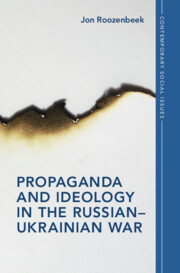11 results
Russian State-Controlled Propaganda and its Proxies: Pro-Russian Political Actors in Japan
-
- Journal:
- Asia-Pacific Journal / Volume 22 / Issue 3 / March 2024
- Published online by Cambridge University Press:
- 14 March 2025, e6
-
- Article
-
- You have access
- Export citation
Some Lessons from the Post-Soviet Era and the Russo-Ukrainian War for the Study of Nationalism
-
- Journal:
- Ethics & International Affairs / Volume 38 / Issue 3 / Fall 2024
- Published online by Cambridge University Press:
- 23 January 2025, pp. 333-353
-
- Article
-
- You have access
- HTML
- Export citation
Vladimir Putin, Normative Isomorphism, and the Language/Dialect Dichotomy
-
- Journal:
- Nationalities Papers , FirstView
- Published online by Cambridge University Press:
- 10 January 2025, pp. 1-13
-
- Article
-
- You have access
- Open access
- HTML
- Export citation
4 - Russia
-
-
- Book:
- States and their Nationals Abroad
- Published online:
- 04 December 2024
- Print publication:
- 05 December 2024, pp 83-106
-
- Chapter
- Export citation
Returning the War to Russia: Drones and Discrimination in the Defense of Ukraine
-
- Journal:
- Ethics & International Affairs / Volume 38 / Issue 1 / Spring 2024
- Published online by Cambridge University Press:
- 01 October 2024, pp. 54-63
-
- Article
-
- You have access
- Open access
- HTML
- Export citation
Digital war diaries: Witnessing the 2022 Russian War against Ukraine
- Part of
-
- Journal:
- Memory, Mind & Media / Volume 3 / 2024
- Published online by Cambridge University Press:
- 30 May 2024, e15
-
- Article
-
- You have access
- Open access
- HTML
- Export citation

Propaganda and Ideology in the Russian–Ukrainian War
-
- Published online:
- 16 May 2024
- Print publication:
- 23 May 2024
Women and Men Politicians’ Response to War: Evidence from Ukraine
-
- Journal:
- International Organization / Volume 78 / Issue 2 / Spring 2024
- Published online by Cambridge University Press:
- 16 May 2024, pp. 321-340
- Print publication:
- Spring 2024
-
- Article
-
- You have access
- Open access
- HTML
- Export citation
6 - Conjuring Uncertainty (1989–2022)
-
- Book:
- Worlds of Uncertainty
- Published online:
- 21 December 2023
- Print publication:
- 07 December 2023, pp 205-270
-
- Chapter
- Export citation
Passionate humility for global constitutionalism in the aftermath of the Russo-Ukrainian war
-
- Journal:
- Global Constitutionalism / Volume 13 / Issue 2 / July 2024
- Published online by Cambridge University Press:
- 18 September 2023, pp. 305-316
-
- Article
-
- You have access
- Open access
- HTML
- Export citation
Europe’s Refugee “Crises” and the Biopolitics of Risk
-
- Journal:
- European Journal of Risk Regulation / Volume 15 / Issue 2 / June 2024
- Published online by Cambridge University Press:
- 20 July 2023, pp. 416-430
-
- Article
-
- You have access
- HTML
- Export citation


